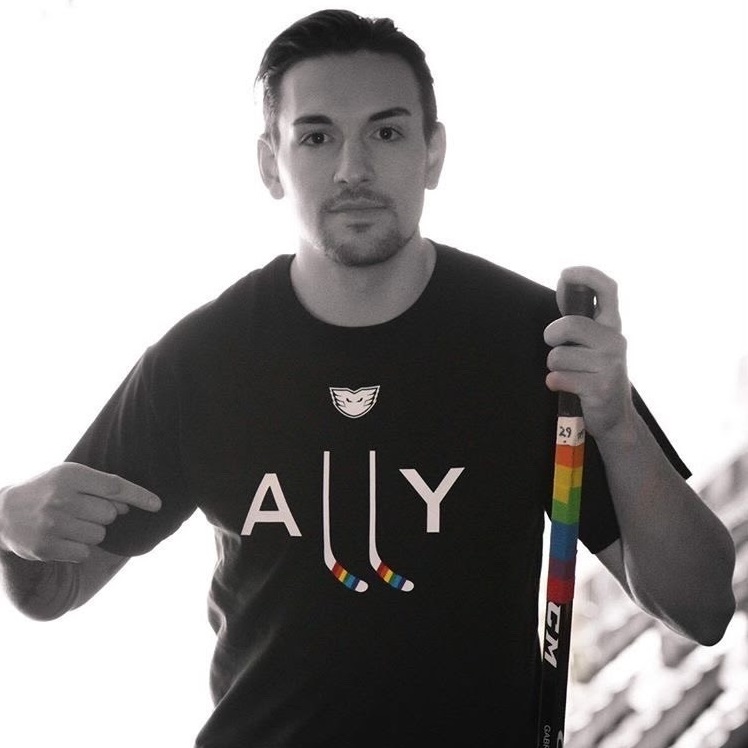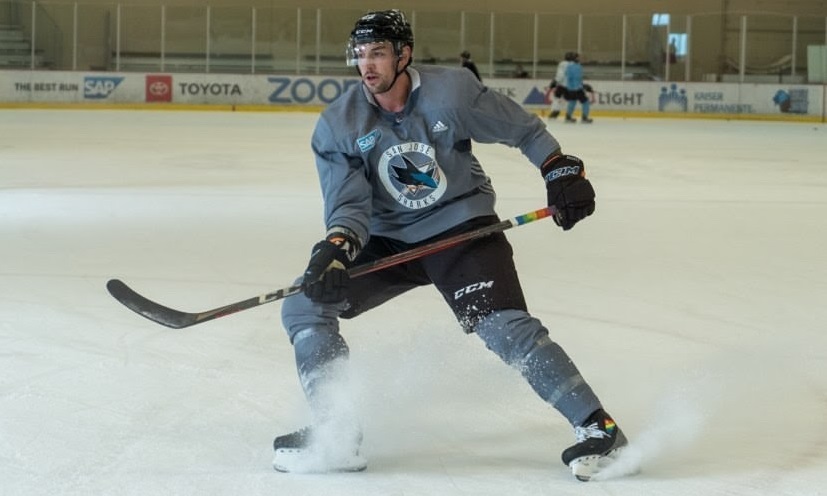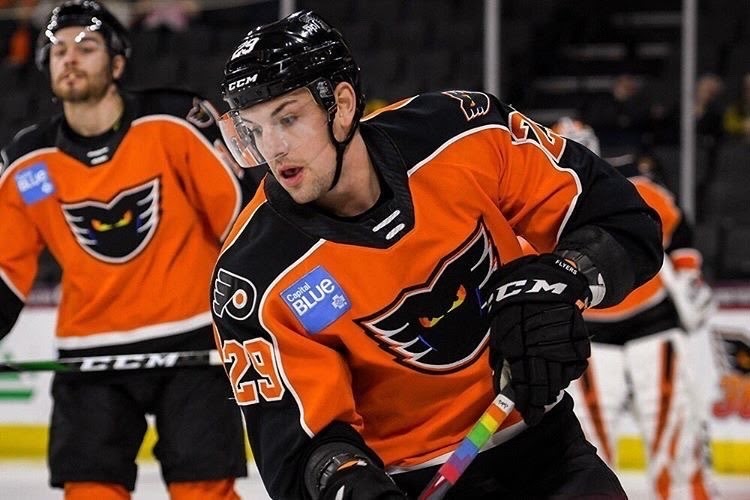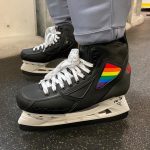Kurtis Gabriel: ‘The NHL needs to get uncomfortable’

In the first in a series of feature interviews for LGBT+ History Month, Jay Forster meets the San Jose Sharks forward whose goal scored with a stick wrapped in Pride Tape has led to a level of allyship rarely seen in men’s pro hockey – and who now wants to inspire more players to become advocates…

Jay Forster is a freelance journalist who has been covering LGBT+ stories in ice hockey since January 2020.

His personal story was featured by Sky Sports in the build-up to Pride Weekend in the Elite Ice Hockey League last year.
The following month, and again for Sky Sports, Jay interviewed Manchester Storm’s Zach Sullivan, who had made headlines worldwide on that Pride Weekend when he came out publicly as bisexual – the first men’s professional hockey player to do so.
This exclusive interview with San Jose Sharks’ Kurtis Gabriel is the first in a series of four exclusive articles by Jay running on Sports Media LGBT+ in February featuring the voices of LGBT+ people and allies in hockey.
(Images: San Jose Sharks (SJS), Kate Frese (KF), Tumbling Run Photography (TRP))
I hesitated initially, when I was looking at who to talk to for LGBT+ History Month, because I’m wary of giving allies too big a platform in a month that is supposed to lift up queer voices.
However, Kurtis Gabriel of the San Jose Sharks is that rare professional hockey player who isn’t afraid to speak out for a community that doesn’t currently have a voice in the top league in the world.
While there is strong advocacy from Brock McGillis, a former OHL player (a major junior league in North America for 16 to 20-year-olds) who came out in 2016, there has yet to be an out LGBT+ player in the NHL, the top professional men’s hockey league in the world.
I wanted to know why, so I spoke to Gabriel about attitudes in the sport towards LGBT+ people, from the point of view of someone on the inside.

The 27-year-old is from Newmarket, Ontario – a few hours drive south from the birthplace of his fellow Canadian, McGillis – and grew up in hockey’s insular and exclusive world. There was almost no exposure to LGBT+ people or culture, and even now, LGBT+ people in the sport are few and far between.
Gabriel was drafted in 2013 by the Minnesota Wild, and spent much of his five-year career with them playing for their AHL team, the Iowa Wild. The AHL functions as a sort of development league for the NHL, and it’s assumed that most AHL players will make their NHL debut at some point in their career. Gabriel was handed his debut in November 2015, but injuries and a lack of opportunities meant that by summer 2018, it was time to move on, and the right wing joined the New Jersey Devils as a free agent.
All in all, it seems like a pretty standard background for a professional men’s hockey player growing up in North America.
However, as he began his stint with the Devils, Gabriel discovered that a friend of his then-girlfriend had been financially cut off from her family for being in a relationship with a woman. Gabriel was shocked. “She’s the sweetest person in the world. Why would she be treated any differently for [dating a woman]?”

Gabriel is, at his core, the kind of person who just wants to be a good teammate. He is not, by his own admission, a big goalscorer, but he protects his teammates. When we sit down over Zoom, he tells me he just finished a practice full of fake fights, to prepare himself for the game the next day. He’s always been the kind of person who stood up to bullies in high school, he tells me. “That [attitude] kind of translated to hockey organically. And now it’s translated to activism organically.”
Gabriel made waves in the hockey world in February 2019, when he scored only his second career NHL goal, against Montreal. The most important part for many was the colour of the tape on his stick.
In December 2015, Jeff McLean and Dr Kristopher Wells started a kickstarter for Pride Tape, a multicoloured rainbow version of the thick canvas tape that hockey players use on the blade and shaft of their sticks to increase grip. Gabriel talks of how he didn’t want to mess with the typical black tape on the blade, but he wrapped Pride Tape around the top of the shaft to celebrate the Devils’ ‘Hockey Is For Everyone’ Night, the once-a-year celebration of minorities in hockey.
Players typically have this rainbow tape on their sticks for warm-ups, before replacing it with normal white or black tape for the game. Gabriel is brutally honest with his original motivation for leaving the Pride Tape on – “it was more effort to take the tape off”. But this initial laziness led to a buzz he wasn’t expecting.
Gabriel ended up scoring a goal with the rainbow tape on his stick, and when he checked his phone after the game, he had dozens of messages split equally between congratulating him for the goal, and thanking him for the use of Pride Tape.

That was the start of something much bigger than one Pride Night game; Gabriel still uses Pride Tape on his sticks to this day, two years later. “I thought about how if it meant so much to so many people, why don’t I just keep doing it?” Gabriel says. It was, quite literally, the bare minimum that he could have done, but that small gesture in 2019 has led to Gabriel becoming one of the more educated and outspoken voices on LGBT+ rights in the world of hockey, a sport that is considered by many to be intolerant of change or difference.
It didn’t stop there, either. Gabriel has become increasingly vocal on the subjects of Black Lives Matter and mental health, recently going so far as to share the story of his father’s struggles and tragic death on social media.
‘You have to do the work’
Gabriel is candid about his origins. He grew up in the same hockey culture as every other NHL player, and he talks willingly about how he previously used homophobic language on the ice. “Brock [McGillis] always says that we’re products of a system,” Gabriel explains. He talks about how he had to unlearn a lot of unconscious biases and behaviours on his journey to being an ally, and, much like the Black Girls Hockey Club pledge, he had to #GetUncomfortable with his straight privilege and overcome what he calls ‘homophobia fragility’. “I couldn’t talk about it,” he admits.
This inability to discuss homophobia was something of a revelation for Gabriel, who, when asked if there was a moment that made him realise that the sport could be doing more for its LGBT+ fans, told me about how no-one wanted to talk about it. The Pride Tape was one small thing – Gabriel stresses that, talking about how “it’s not a lot of effort to make […] for people to feel accepted” – but even that small thing seemed to be taboo. There was no negativity directed to him by teammates, but neither was there any real acknowledgement of his decision, and that was what ended up being a catalyst in Gabriel’s drive to speak out.

This speaking out resulted in connecting with McGillis, whose stories of the OHL and his experience of being a gay man in professional hockey only made Gabriel more passionate, and drove him to do his own research, learning as much as he can about homophobia and transphobia in sports. “I was a little intimidated by Brock. He was so hardcore into doing this.
“And he was so educated – it kind of freaked me out a bit. So Brock reached out initially, but I didn’t really connect with him until quite a time later. I needed that time to kind of catch up and be able to hold my own in the conversation about it. I think that’s a part of it. You have to do the work on it.”
A call for active allyship
While no one on his previous teams seemed to want to talk about it, Gabriel was lucky enough to land with the San Jose Sharks this offseason. The Sharks launched their own activism campaign in January of this year, the ‘Teal For Change Council’, which is designed to address “diversity, equity, inclusion, and social justice” within both their organisation and the Bay Area, where the team is based.
Though he has spent much of the young season thus far with the San Jose Barracuda, the Sharks’ development team, Gabriel has nothing but good things to say about the organisation. “It starts from the top down,” he explains. The Sharks seem to focus on making sure they hire good people first, and then the hockey comes second, and Gabriel talks about how that all starts with general manager Doug Wilson Sr, and trickles down through management, players, and employees.
The Sharks also have a prominent fan club, the Teal City Crew, who have been notable for supporting Black Lives Matter and LGBT+ rights both at games and in the community.
But what can the NHL do better? What should their next step be in all of this? Gabriel has a couple of ideas. “Start reaching out more […] There’s nothing wrong with asking for help.” The NHL can’t just keep starting their own committees; they need to talk to LGBT+ people within the sport and outside the sport to really start to affect change. “They have to get uncomfortable.”

That goes for fans, too. I asked Gabriel what advice he has for people that want to start getting involved in activism and being an ally. He talks about people having to make the choice to get uncomfortable, to admit there are things they don’t know or understand. He stresses that he doesn’t expect people to be as outspoken as he is, and he doesn’t tell people that they need to commit their whole life to it, but to just set aside an hour a week to read something, or learn something. “Approach it like you approach anything else in life that you want to get better at.”
In the end, it all comes back to the Pride Tape. I asked Gabriel if he could share any particularly meaningful stories from people that message him; his Instagram stories frequently feature anonymised screenshots of people telling him that he changed the way they think about LGBT+ people, or that they came out because of him.
He talks about not only those, but the handwritten letters that get sent to him via Pride Tape co-founder Jeff McLean. “That’s what it’s all about for me,” Gabriel says, with a smile. “I love doing this.”
Follow Jay Forster on Twitter at @jaythegoalie.
Further reading…
Zach Sullivan: ‘Other LGBT+ athletes will support you’

Sports Media LGBT+ is a network, advocacy, and consultancy group that is helping to build a community of LGBT+ people and allies in sport. Learn more about us here.
Read about our support for LGBT+ History Month in February.
LGBT+ or a strong ally in sports? Your story could help to inspire other people – you don’t have to be famous to make an impact, and there are huge gains to be made both personally and publicly. Start a conversation with us, in confidence, and we’ll give you the best advice on navigating this part of your journey.
Email jon@sportsmedialgbt.com or send a message anonymously on our Curious Cat.


